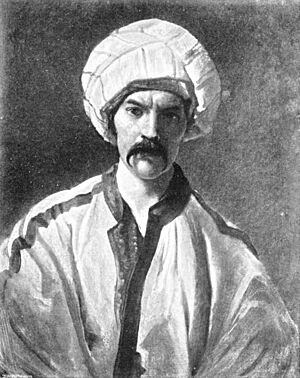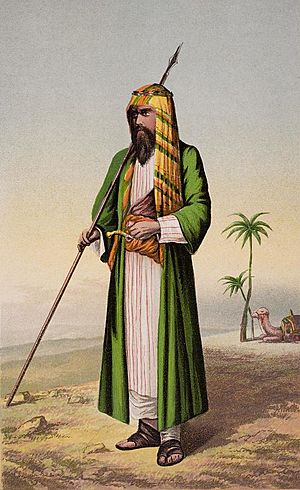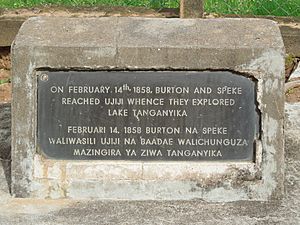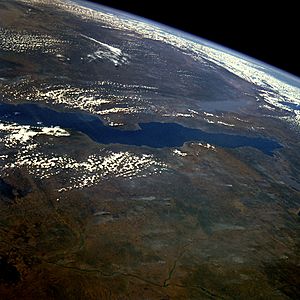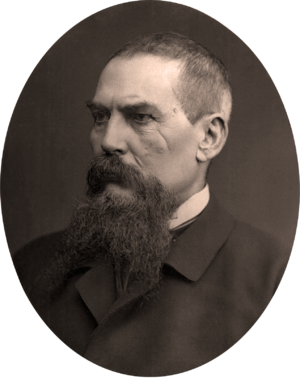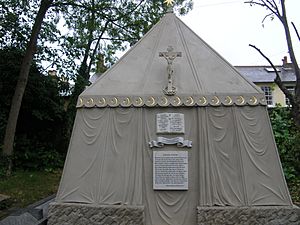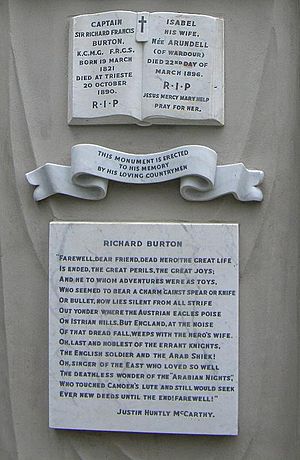Richard Francis Burton facts for kids
Quick facts for kids
Richard Francis Burton
|
|
|---|---|
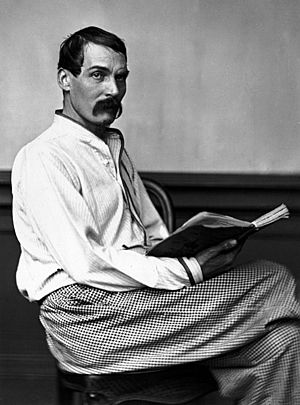
Burton in 1864
|
|
| Diplomatic posts | |
| British consul in Fernando Pó | |
| British consul in Santos | |
| British consul in Damascus | |
| British consul in Trieste | |
| Personal details | |
| Born | 19 March 1821 Torquay, Devon, England |
| Died | 20 October 1890 (aged 69) Trieste, Austria-Hungary |
| Spouse |
Isabel Arundell
(m. 1861) |
| Alma mater | Trinity College, Oxford |
| Signature | |
| Nickname | Ruffian Dick |
| Military service | |
| Allegiance | British Empire |
| Branch/service | Bombay Army |
| Years of service | 1842–1861 |
| Rank | Captain |
| Battles/wars | Crimean War |
| Awards | Knight Commander of the Order of St Michael and St George and Crimea Medal |
| Writing career | |
| Pen name |
|
| Notable works |
|
Sir Richard Francis Burton (1821–1890) was a famous British explorer, writer, and soldier. He was known for his amazing travels across Asia, Africa, and the Americas. He also had an incredible talent for learning languages and understanding different cultures. Some say he could speak twenty-nine languages!
Burton's most famous adventures include a secret journey to Mecca. At that time, non-Muslims were not allowed there. He also translated One Thousand and One Nights, often called The Arabian Nights. Another big achievement was exploring the Great Lakes of Africa with John Hanning Speke. They were among the first Europeans to see these lakes while searching for the source of the Nile.
Burton wrote many books and articles about his travels and observations. He often added detailed notes to his books. He served as a captain in the army in India and later as a British consul in different countries. In 1886, he was made a knight.
Contents
Richard Burton's Life and Adventures
Early Life and Education (1821–1841)
Richard Burton was born in Torquay, England, on March 19, 1821. His family traveled a lot when he was a child. They lived in England, France, and Italy. Richard had tutors at home and also went to a school in Richmond, Surrey.
He showed a great talent for languages from a young age. He quickly learned French, Italian, and Latin. He also picked up several dialects and even some of the Romani language. These travels might have made him feel like an outsider, but he believed in following his own path.
In 1840, Burton went to Trinity College, Oxford. He was very smart but often argued with his teachers and other students. He even challenged another student to a duel once! He continued to study languages, especially Arabic. He also spent time learning falconry and fencing. He was eventually expelled from Oxford for breaking college rules.
Army Career and Early Travels (1842–1853)
After leaving Oxford, Burton joined the army of the East India Company. He was sent to India. There, he became very good at many Indian languages, including Hindustani, Gujarati, and Sindhi. He also learned Persian and Arabic.
Burton was very interested in Indian cultures and religions. He even adopted some local customs, which made him different from other soldiers. He was known as "Ruffian Dick" because he was a fierce fighter. He also tried to learn animal communication by keeping many monkeys!
Journey to Mecca (1851–1853)
One of Burton's most famous adventures was his pilgrimage to Medina and Mecca in 1853. This was a very dangerous journey because non-Muslims were not allowed in these holy cities. He disguised himself as a Muslim traveler. He studied Islamic traditions and manners carefully to avoid being discovered.
He traveled through Egypt, then to Suez, and sailed to Yambu. From there, he joined a group of nomads to Medina. He then went to Mecca, where he took part in the holy rituals. He secretly took notes about everything he saw. His journey was risky, and his group was even attacked by bandits. If he had been discovered as a European, he could have been killed.
After returning to India, Burton wrote a book about his journey called A Personal Narrative of a Pilgrimage to Al-Madinah and Meccah. This book made him famous.
Exploring East Africa (1854–1855)
In 1854, the Royal Geographical Society supported Burton's expedition to Somaliland. He traveled with John Hanning Speke and others. Burton disguised himself again as an Arab merchant to explore the city of Harar. He was the first European known to have entered this city.
Later, while preparing to search for the source of the Nile, his group was attacked by warriors near Berbera. One of his companions was killed, and Speke was wounded. Burton himself was hit in the face with a javelin, leaving a noticeable scar. This expedition's failure caused problems for his career. He wrote about this difficult experience in his book First Footsteps in East Africa.
After recovering, Burton briefly served in the Crimean War in Turkey.
Searching for the Nile's Source (1856–1860)
In 1856, Burton and Speke received funding for another expedition. Their goal was to explore the unknown Lake regions of Central Africa. They started from Zanzibar and traveled inland. They faced many challenges, including diseases like malaria, and their supplies were often stolen.
On February 13, 1858, they reached Lake Tanganyika. Burton was amazed by the lake's beauty. Speke, who was temporarily blinded, could not see it. During their return journey, Burton fell ill. Speke continued exploring alone and discovered the large Lake Victoria on August 3. Speke believed this was the source of the Nile.
Burton wrote about their journey in Lake Regions of Equatorial Africa. Speke also wrote his own account.
The Burton and Speke Disagreement
After their expedition, Burton and Speke had a big public argument. Speke returned to London first and announced that Lake Victoria was the source of the Nile. Burton felt Speke broke an agreement they had to announce their findings together.
Some people believe Speke was jealous of Burton's leadership. Others, like historian Tim Jeal, suggest Burton was jealous of Speke's discovery. Burton often criticized Speke, partly because Speke didn't speak Arabic or African languages.
Speke went on a second expedition to prove his theory about Lake Victoria. A debate between Burton and Speke was planned for September 16, 1864. However, the day before the debate, Speke died from a gunshot wound while hunting. It was ruled an accident.
Diplomatic Career and Later Writings (1861–1890)
On January 22, 1861, Burton married Isabel Arundel. Soon after, he began working for the British Diplomatic Service. His first job was as a consul on the island of Fernando Po (now Bioko in Equatorial Guinea). The climate was very unhealthy, so Isabel could not join him. Burton spent this time exploring West Africa.
In 1865, he was transferred to Santos in Brazil. He traveled through Brazil's highlands and canoed down the São Francisco River. He wrote about these experiences in The Highlands of Brazil.
In 1868, he became the British consul in Damascus, a city in Syria. This job was perfect for him because he knew a lot about the region and its customs. However, there was a lot of tension between different groups in Damascus. Burton tried to keep the peace, but this sometimes caused him trouble. He was recalled from Damascus in 1871.
Burton was then sent to Trieste in Austria-Hungary in 1872. He wasn't very happy with this job, but it gave him time to write and travel.
In 1886, Queen Victoria made him a Knight Commander of the Order of St Michael and St George. This meant he could use the title "Sir."
During this period, he wrote many books. His most famous translation was The Book of the Thousand Nights and a Night (The Arabian Nights), published in 1885. He also translated The Perfumed Garden and wrote The Kasidah, a long poem. Other notable works include Vikram and the Vampire (a collection of Hindu tales) and The Book of the Sword (about swordsmanship). He also translated The Lusiads, a famous Portuguese epic poem.
Death and Legacy
Richard Burton died in Trieste on October 20, 1890, from a heart attack. His wife, Isabel, was very sad after his death. She burned many of his private papers and journals. She believed she was protecting his reputation, especially by burning a new translation of The Perfumed Garden. However, many of his writings still exist today.
Richard and Isabel Burton are buried in a unique tomb in the shape of a Bedouin tent in southwest London. You can even look through a window at the back of the tent to see their coffins. There is also a stained-glass window in a nearby church that honors Burton.
Timeline of Richard Francis Burton's Life
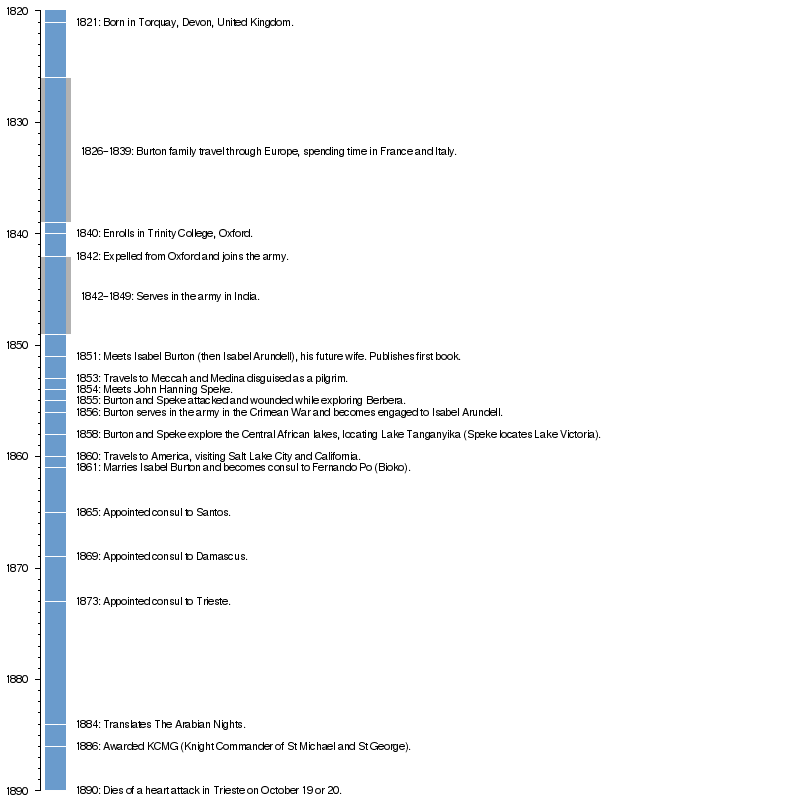
Works and Writings
Burton wrote more than 40 books and many articles, essays, and letters. Many of his writings have not been fully listed. You can find over 200 of them online at burtoniana.org.
Some short parts from his different writings are available in a book called Of No Country: An Anthology of Richard Burton by Frank McLynn.
See also
 In Spanish: Richard Francis Burton para niños
In Spanish: Richard Francis Burton para niños
- Selim Aga
- Mausoleum of Sir Richard and Lady Burton
- List of polyglots
 | Audre Lorde |
 | John Berry Meachum |
 | Ferdinand Lee Barnett |


